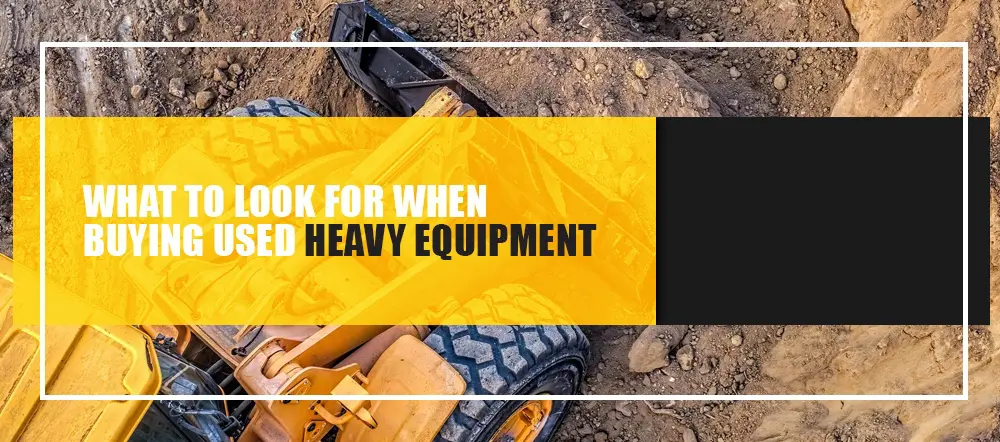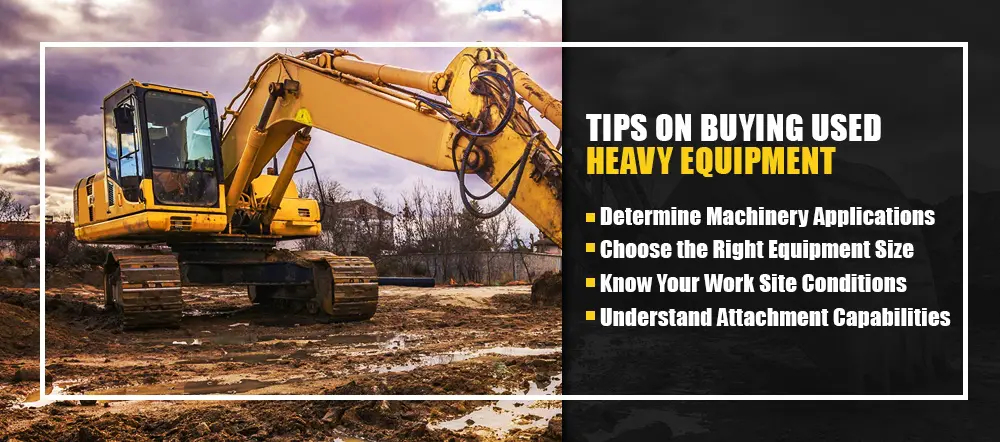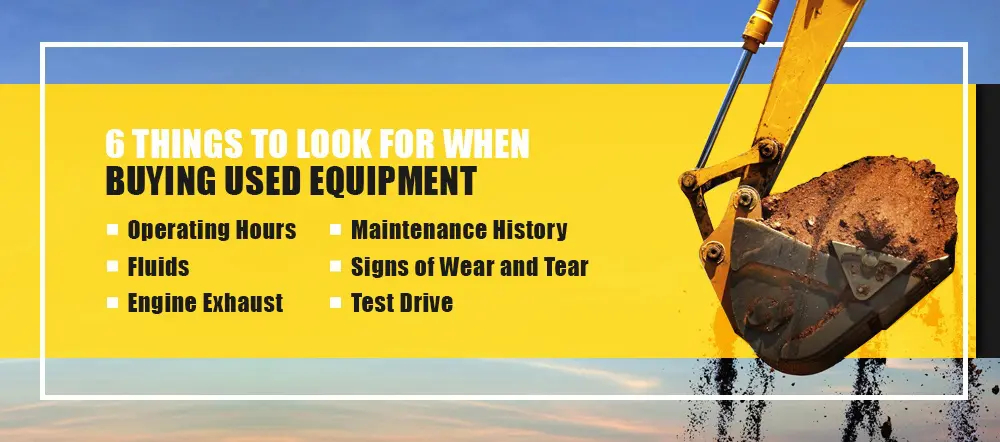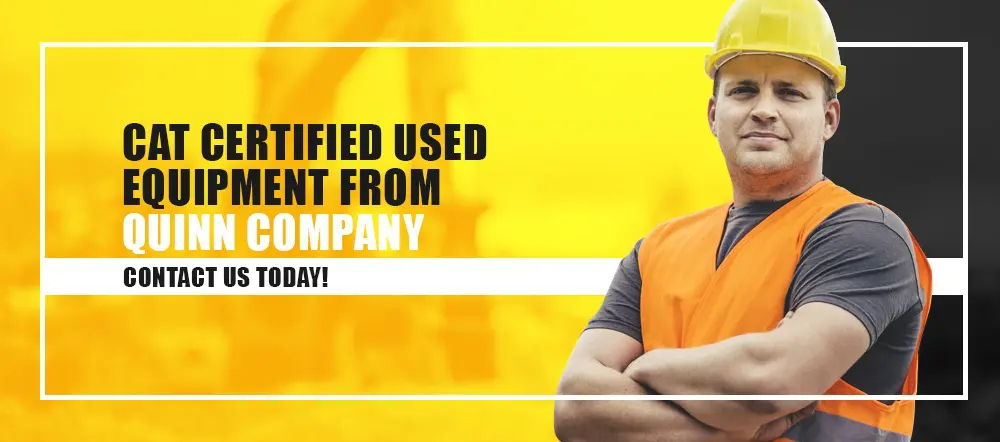
Contractors growing their construction or landscaping businesses inevitably face the same decision when it comes time to expand their fleet — whether to buy or rent their next piece of heavy equipment. For businesses making long-term investments in owning their own machinery, there’s another important choice to make between purchasing brand new equipment or buying it used.
There are advantages to both, but in many cases, buying used equipment is a better financial decision. Used equipment has a lower upfront cost than new equipment, making it easier for business owners to grow their fleet strategically. While heavy machinery is manufactured to have a long service life, it doesn’t mean that all used equipment will continue to function properly. When investing in your next piece of machinery, it’s critical to know how to buy used heavy equipment and do your due diligence.
In this used equipment buying guide, we’ll cover the top things to look for when buying used equipment so you can make a smart investment that will serve you for years to come.
Jump To Sections:
- Tips on Buying Used Heavy Equipment
- 6 Things to Look for When Buying Used Equipment
- Buying Used Cat® Construction Equipment
- Cat Certified Used Equipment From Quinn Company
Tips on Buying Used Heavy Equipment
If you’ve decided that buying used machinery is the right avenue for your next equipment investment, then there are a few things to consider when selecting the right piece. You’ll need to think of your business needs both in the short- and long-term. With so much selection available, it’s important to narrow down your options and invest in the best possible machine for your needs. Here are some tips for buying used construction equipment:

1. Determine Machinery Applications
Every piece of heavy machinery is designed for an ideal role. Backhoes, excavators and loaders are each designed to accomplish unique tasks, making them efficient and productive for certain jobs. When buying used equipment, assess your current fleet and determine which machinery applications you need the most to improve your operations and profitability.
2. Choose the Right Equipment Size
It’s not enough to know which type of machinery you need, you also need to know the correct capacity you require. Buying machines that are undersized for your project needs can lead to inefficient work, taking longer to complete projects. But buying machines that are overkill for the job also presents risks and higher operating costs. Be sure to consult with a heavy equipment specialist to determine the right size of equipment for your typical jobs.
3. Know Your Work Site Conditions
When buying used equipment, you’ll also need to consider the environment in which you’ll be operating your machine. Consider the typical job sites you work on and what features your equipment needs to run successfully. Think about climate and whether you need an enclosed or covered cab. The job site’s terrain will also determine whether you need tracks or wheels on your machines.
4. Understand Attachment Capabilities
Work tool attachments can give your machine extreme versatility, allowing you to accomplish more in less time. Before purchasing used equipment, be sure that the model you’re looking at is compatible with the types of attachments you’ll be running. You’ll also need to think ahead about what work tool attachments you may need for future projects as your business grows.
6 Things to Look for When Buying Used Equipment
Once you’ve determined which make and model of machinery you want to add to your fleet, the next step is to find the right machine that will serve you well over several years. For this, you need to know what to look for when buying used heavy equipment. Put together an inspection checklist to make sure you’re buying a good quality machine that’s been well-maintained. When starting your inspection, keep in mind the following things to consider when buying used construction equipment.

1. Operating Hours
A heavy machine’s lifespan is determined based on its total operating hours, not its mileage like with cars or trucks. Every piece of equipment has an internal clock that keeps track of the number of hours it’s been in use. How long a machine has been under operation compared to how old it is determines whether it’s been over or underused for its life. For example, you can compare two exact models built in the same year, but one may have much less operating time, typically making it more valuable.
Information about a machine’s total operating time, while not the only consideration, can help paint a picture of how much serviceable life it may have left. It can also indicate what to expect in upcoming maintenance and replacement requirements.
2. Fluids
A machine’s fluids are like its vital signs, and their condition can tell you a lot about the machine’s current health. The fluids you should check on a used piece of machinery include the hydraulic fluid, transmission fluid, engine oil and coolant. If these fluids are clean and at a good level, then it can indicate that the machine was properly cared for over the years. If these fluids are contaminated or at a low level, it could indicate the machine has been neglected.
Pay particular attention to symptoms like water in the engine oil or foaming in the coolant and ask for an oil sample from the seller. These characteristics could indicate that the machine may develop more critical issues, such as a blown head gasket or other severe engine malfunctions. Always factor these needed repairs and replacements into the overall asking price to give you a better idea of your true investment in any piece of used heavy machinery.
3. Engine Exhaust
One of the most critical things to consider when buying used construction equipment is what happens when you fire up the engine. When you start the engine, you want to know it’s running smoothly. If it has difficulty starting, then it indicates potential engine troubles. Pay particular attention to the engine’s exhaust. As you start up the engine, you may notice blue, black or white smoke. Blue smoke may indicate an oil leak causing an overheated engine, while black smoke may indicate a filtration problem. White smoke means that water or coolant is leaking into the engine oil.
While checking the engine’s exhaust, also notice whether you feel any vibrations or hear any unusual sounds. By paying attention to what you feel and hear, you can better understand the engine’s health.
4. Maintenance History
More than any other factor, a machine’s maintenance records will tell you what you need to know about its status. Ask the seller for a full rundown on the machine’s history, including whether the owner adhered to the manufacturer’s recommended maintenance intervals. Records will clearly indicate a pattern and whether the machine underwent diligent maintenance.
Pay particular attention to regular fluid changes, such as engine oil and transmission and hydraulic fluids, and ask the seller for an oil sample. Also, note how often the filters have been cleaned and replaced or whether there have been any major parts replacements or rebuilds. Replacement parts should always be certified from the original manufacturer, so be sure to ask about the source of any new parts. A machine’s maintenance history tells you what the equipment has already been through as well as what to expect with upcoming repairs.
5. Signs of Wear and Tear
All used equipment will have signs of wear and tear. But it’s important to distinguish what’s normal and expected wear and tear from what is a clear sign of neglect and misuse. Begin by inspecting the machine’s undercarriage for signs of damage and wear, including rust. Pay particular attention to areas that appear to have been recently repaired. These repairs may have been done in a quick attempt to improve the machine’s appearance before selling.
Perform a thorough walk-through, inspecting the front, back and sides of the machine. Note any structural damage such as hairline cracks that could cause deeper breaks or welding patches that indicate weak points. Look for any body damage, and always inspect the cab thoroughly. Finally, don’t forget to have a good look at the tires or tracks. Worn out tires and tracks will be due for replacement, further adding to your total investment cost.
6. Test Drive
If the used piece of equipment you’re looking at seems like it’s been well-maintained and cared for, the next step is to make certain by giving it a test drive, and to ask for a professional inspection if available. Have your operator come to the seller to try before you buy, giving you a full impression of your potential investment. There’s only so much information you can truly gather until you get hands-on experience with the machine.
Try out all the different controls and features and test the machine at each speed. While operating the machine, notice any sounds or vibrations that happen during certain movements, such as grinding or clunking. Most importantly, consider the overall safety of the machine. If a machine doesn’t operate accurately, it can put workers at risk. After test driving the machine, you’ll be more confident in your decision to buy used equipment from this particular dealer.
Buying Used Cat® Construction Equipment
A final important thing to consider when buying used equipment is the manufacturer and the dealer’s reputation. When looking for reliable used equipment, you can count on certified Cat® used equipment distributed by an authorized Cat dealer. Cat Certified Used Machines are inspected and maintained by trusted Cat dealers. This means that used equipment purchased through a Cat dealer has been serviced by expert Cat technicians using genuine Cat parts.
You can always expect a clear and thorough machine history to accompany any used Cat machine you’re looking at. Cat Certified Used Machines also come with the trusted Caterpillar® warranty, so you can rest assured you’re getting a reliable, high-performing machine.
Cat Certified Used Equipment From Quinn Company
Buying used heavy equipment requires conducting due diligence to ensure you’re getting machinery of high value that will improve your job performance. If you’re in the market for used heavy equipment, choose Quinn for Cat Certified Used Machines in Southern California.
Browse our inventory of used equipment for sale to find the right used heavy machinery for you. For a quote or assistance, contact us today. Call us at 1-888-987-8466 or stop by one of our convenient locations.


